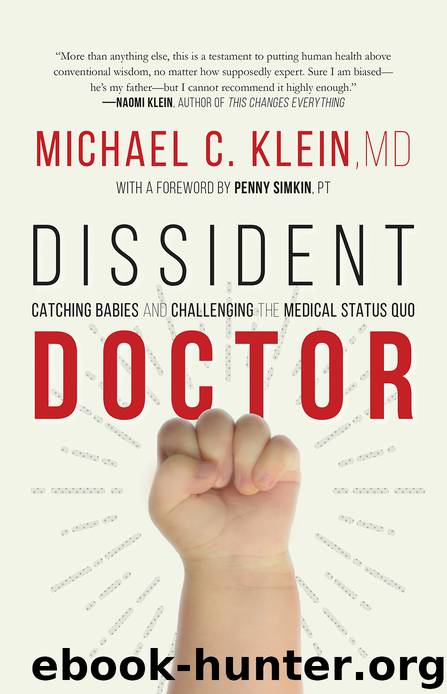Dissident Doctor by Michael C. Klein

Author:Michael C. Klein
Language: eng
Format: epub
Tags: Physicians, Canada, Biography, Midwifery, Maternal health services, Pediatrics
ISBN: 9781771621939
Publisher: Douglas and McIntyre (2013) Ltd.
Published: 2018-09-07T16:00:00+00:00
26. Herzl Doctors Expand
From the beginning at Herzl, we epitomized patient-centred care. It was not about what we wanted; it was about what the patients, families and community needed. One of the beauties of family practice is its flexibility. Depending on location and need, family practice can evolve to provide needed services either directly or in association with specialists, nurses and other health workers. At Herzl we were open to caring for many different kinds of patients. One of our staff members began a special clinic for teenagers. Another began a methadone clinic for addicts. We soon began our own family medicine ward where we cared for a variety of patients who did not fit within the purview of traditional specialties.
Some of our members took turns working in the emergency room and a few became emergency medicine specialists. It was all about adaptability. To consolidate family practice as an important discipline, we consciously took on activities that no one else wanted, thereby making family medicine indispensable. This was necessary because some at Jewish General found family medicine interesting but perhaps unnecessary or misplaced in a hospital that aspired to be a tertiary care centre.
The orthopaedic surgeons just wanted to be in the operating room, rather than caring for “little old ladies” who broke their hips. The outcomes of surgery were not ideal, including too many post-operative complications. But with family doctors running the ward, complication rates were much reduced. We were asking and answering the question “How and why did she fall in the first place?” Often, it was because of over-medication. We reduced meds and tried to prevent the next fall. Then the neurologists saw what was going on and asked us to run their ward as well so that they could concentrate on diagnostics and their special skills. Many of their patients with strokes benefitted from our comprehensive approach.
We were also at the forefront in Canada of the development of the formal academic discipline of geriatrics. I was fortunate to be able to recruit Dr. Mark Clarfield to Herzl, who soon developed the long-term ward and established a model of humane, effective geriatric care, and the hospital became a model for the country. Mark went on to be the head of geriatrics for all of Israel and is now chief of geriatrics at Ben-Gurion University of the Negev.
Howard Bergman, one of my McGill student advisees from the Clinique Saint-Jacques days, became the main physician for an East End clinic that evolved from Clinique Saint-Jacques when Medicare came to Canada in 1970. Dr. Bergman’s clinic became one of the precursors of the CLSCs. Howard changed careers and joined Mark Clarfield in the development of Canadian geriatrics. He is now chief of academic family medicine at McGill.
Michael Dworkind, one of our first residents, developed the palliative care team at the Jewish General Hospital. He is also a leader in environmental and health peace activities nationally and a powerful voice for reconciliation between the Israelis and Palestinians. Another of our residents, Issie’s son, David Tannenbaum, became head of family practice at the University of Toronto.
Download
This site does not store any files on its server. We only index and link to content provided by other sites. Please contact the content providers to delete copyright contents if any and email us, we'll remove relevant links or contents immediately.
Name Book, The: Over 10,000 Names--Their Meanings, Origins, and Spiritual Significance by Astoria Dorothy(2987)
Tone Your Tummy Type by Denise Austin(2847)
The Ultimate Guide to Anal Sex for Women by Tristan Taormino(2299)
The Expectant Father by Armin A. Brott & Jennifer Ash(2273)
The Coregasm Workout by Debby Herbenick(2272)
The Women's Health Fitness Fix by Jen Ator(2242)
Expecting Better by Emily Oster(2212)
She-ology by Sherry A. Ross MD(2165)
The Hite Report on Shere Hite by Shere Hite(2066)
Woman: An Intimate Geography by Natalie Angier(1940)
8 Steps to Reverse Your PCOS by Fiona McCulloch(1915)
Birth by Tina Cassidy(1905)
The Female Brain by M.D. Louann Brizendine(1901)
101 Get-Lean Workouts and Strategies by Muscle & Fitness(1870)
Women & the Weight Loss Tamasha by Diwekar Rujuta(1801)
50 Ways to Soothe Yourself Without Food by Susan Albers(1793)
The Big Booty Blueprint: Your Guide To A Bigger Butt In Less Than 12 Weeks by Bella Rahbek & Brandon Carter(1672)
The overachievers by Robbins Alexandra(1581)
Unleash the Power of the Female Brain: Supercharging Yours for Better Health, Energy, Mood, Focus, and Sex by Daniel G. Amen M.D(1576)
